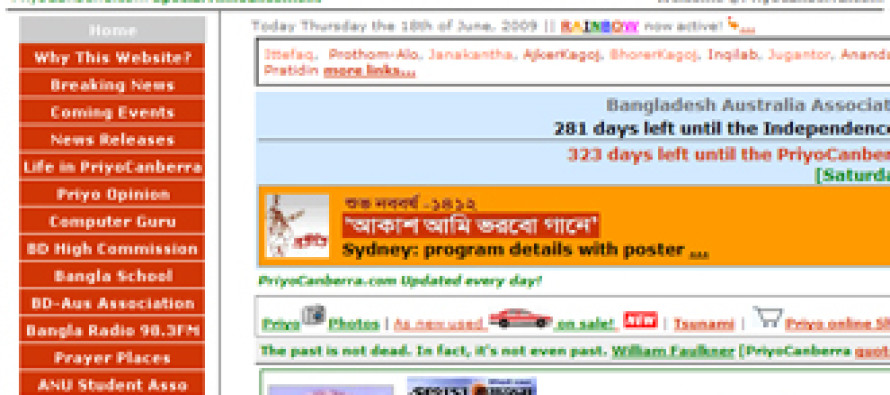See back 2004 : Down Memory Lane : PARADIGM SHIFT by Abed Chaudhury

Mr. Jainal Abedin is a quietly spoken man precise with his words, and faultless in his humility. But what he did last week in Canberra spoke loud and clear. In a cold windy day he presided over a Baishakhi mela, signaling the arrival of a new year in distant northern land of Bangladesh. As current president of Bangladesh Australia Association (BAA) he, together with his colleagues, arranged a day-long festivities in this capital city of Australia –– festivities that show-cased, with the help of our many students in the campus of Australian National University (ANU), the rich and vibrant face of Bangladesh.
Baishakh, derived from Bishakha, a star (and also the fiery-tempered sister of Radha), heralds the arrival of the time of Aries, the fabled start of a new season in eastern Asia including Bangladesh. This is 1411 of Bongabdo, of a calendar that carries in it the legacy of Hindu roots, but made hybrid through the involvement of Emperor Akbar in 1584, or 963 Hijri when he linked the Bangla year to the Hijri lunar calendar. Baishakh was also chosen by Akbar (rather than the existing Chaitro as the first month) as the first month since on that year Baishakh co-incided with the month of Muharram. Since then reverted back to a solar calendar, our Bangla calendar is partly a brain-child of Muslims, Tarikh-i-Elahi, as it was called in the beginning. That is why the Bangla year is 1411, it approximates the time of Hijrat of the prophet; since its reversion to a solar counting the years have deviated from Hijri but the temporal linkage is obvious. I hope this history will mollify the Khatib of Baitul Mukarram who seems to have taken a dim view of the observance of the new year festivities of this calendar.
In Canberra, a land of deep southern inversion of seasons, these festivities are strongly cultural –– a search for and observance of our Bangali roots. So every year in Australia, so far in Sydney, Bangalis observe the new Bangla year and sing of fiery Baishakh even as they are bathed in the mellow light of winter. This year the festival came to Canberra and the result was spectacular. Chilly wind could not dampen the Bangali spirit. The artistic flair of Priyanka, the multitalented cultural secretary of BAA, found natural synergism with Josh, a drama talent and Avijit, a popular singer. The result was day-long songs and poetry recitals followed by a full-length drama called “Narak Gulzar” in the evening.
There was no shortage of enthusiasm among Bangalis for this programme. Scores of people drove over from Sydney braving chilly winds. Nehal Bari of Boimela Parishad came with his car full of Bangla books and set up a small book fair. Nehal Bari has been arranging book fairs in Australia for a number of years. It is about time Bangla Academy noticed his activities. To already existing Canberra institutions led by Ehsanullah (Bangla Radio), Zillur Rahman (Bangla School), was added the insignia of cyber age, the brand new website (Shahadat Manik). To add a modern cyber drama mimicking a virtual Kalbaishakhi, the web-site was destroyed by unnamed hackers within a few hours of its inaugural. Now restored, the site describes the full range of activities that can now be browsed by people from all over the world.

The Bangladesh High Commission played a positive role during the occasion. The High Commissioner was present during much of the day and his wife, Mrs. Laila Haroon, led the singers in the morning in the rendition of Esho-Hey-Baishakh. Food stalls, book-shops, mini grocery-marts all mingled in a narrow corridor of an ANU building. The mainstream Australian population, particularly those associated with the University, was fascinated. One student marvelled at our raucous spirit at the imaginary year of the inverted season until I pointed out to him that much of life in fact was about things that we could neither understand nor fathom. That celebration of imponderable in fact is the essence of human spirit and I am happy that it has not yet left the Bangalis.
There has been much talk recently of using culture as a stimulator of trade, particularly during the recent visit of a trade delegation from Bangladesh to Australia. The warmth and spirit displayed by the events in Canberra tell me that cultural events are as emblematic of Bangladesh as tai-chi is of china or champagne is of France. Trade, diplomacy, and such other serious business can easily be energized by a shot of good old Bangla culture.
Mr. Jainal Abedin, together with his colleagues, has opened a door. By making a day vibrant, unseasonably, purely by the power of human imagination, he has displayed that Bangalis can achieve just about anything they want. It is the will, not the ability, that is lacking.


